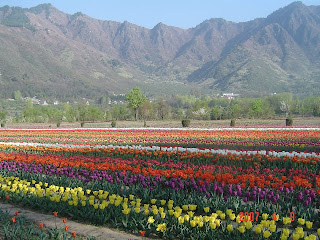Aah!
The beauty of Urdu language. I think Urdu must be the richest and the
most respectful of all languages. It has adab
(etiquette) and softness. I simply love Urdu and consider myself
unfortunate to not have been a formal student of this language.
Specially when it comes to poetry, no other medium can match up to
the eloquence of Urdu. This medium is powerful and articulate, the
speaker leaves a lasting impression on the audience. Just sample
this:
"Raghon
mein daurhte phirne ke hum nahin qaayal,
Jo
aankh hi se na tapka to phir lahoo kya hai?"
(I don't
believe in blood running around in veins, the blood is not blood
unless it drips from your eyes!) Simpler translation is that you have
to prove your point in an intense manner.
There
have been innumerable poets in Urdu. Urdu has borrowed many words
from the Persian language. Amir Khusro (1253-1325), Kabir (1440-1518)
and many other poets of earlier era were to inspire later Urdu poets
and served as intellectual and linguistic sources. Among the greatest
Urdu poets can be counted stalwarts such as Ghalib, Dard, Meer,
Iqbal, Zauq, Josh, Jigar, Faiz, Ahmed Faraz, Firaq and Adam.
Ghalib
remains the best of all. I am particularly fond of this poem:
Aah
ko chahiye ik umr asar hone tak,
Kaun
jeeta hai teri zulf ke sar hone tak?
(A lifetime passes
before a sigh shows its effects,
Who would wait so long to see your curls fixed up?)
Who would wait so long to see your curls fixed up?)
Aashiqui,
sabr, talab aur tamanna betaab,
Dil
ka kya rang karoon khoon-e-jigar hone tak?
(Love
asks for patience but lust is restless,
What colour do I call my heart till it bleeds to death?)
What colour do I call my heart till it bleeds to death?)
Hum
ne maana ke taghaaful na karoge lekin,
Khaaq
ho jaayenge hum tum ko khabar hone tak,
(You
won't disregard me, I know that, but when
you know of me I would have become dust)
you know of me I would have become dust)
Partav-e
khur se hai shabnam ko fana'a ki taaleem,
Main bhi hoon ik inaayat ki nazar hone tak,
Main bhi hoon ik inaayat ki nazar hone tak,
(The
morning sun’s ardent rays spell death to dew drops,
I, too, exist only until you cast a glance at me)
I, too, exist only until you cast a glance at me)
Yak
nazar besh nahin fursat-e-hasti ghaafil,
Garmi-e-bazm
hai ik raqs -e-sharar hone tak,
(A glance from you will
bring my life to end,
Like the dancing sparks end a party's fun)
Like the dancing sparks end a party's fun)
Gham-e-hasti
ka 'Asad' kis se ho juz marg ilaaj,
Shama
har rang mein jalti hai sahar hone tak.
(Life
is all suffering, Asad. Its cure is only death,
The candle burns in many colours till the morning comes)
The candle burns in many colours till the morning comes)







